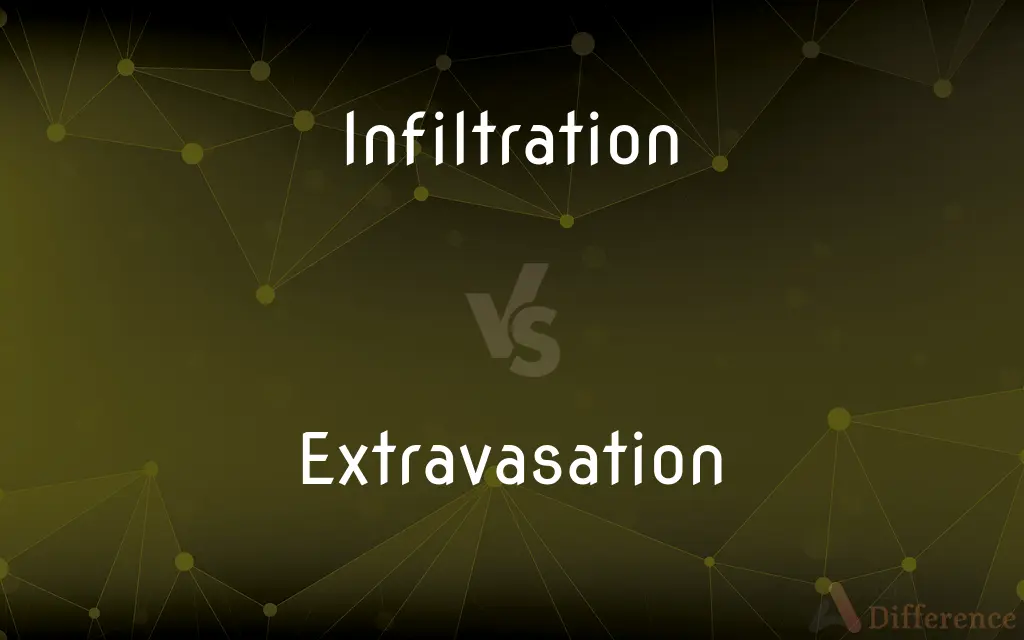Infiltration vs. Extravasation — What's the Difference?
By Maham Liaqat & Urooj Arif — Updated on April 16, 2024
Infiltration involves the unintended leakage of non-vesicant fluids into surrounding tissues, often during IV therapy, whereas extravasation occurs when vesicant substances leak, causing severe tissue damage.

Difference Between Infiltration and Extravasation
Table of Contents
ADVERTISEMENT
Key Differences
Infiltration occurs when fluid from medical treatments like IV therapy unintentionally leaks into the surrounding tissue. Whereas extravasation refers specifically to the leakage of vesicant drugs, which can cause severe local tissue damage and even necrosis.
The clinical implications of infiltration are typically less severe, often resulting in swelling and discomfort, on the other hand, extravasation can lead to more significant consequences including severe pain, blistering, and permanent tissue damage.
Infiltration is generally managed by removing the IV catheter and applying a warm or cold compress depending on the type of fluid infused, whereas extravasation requires more aggressive interventions, including possible administration of antidotes, surgical consultation, and in some cases, plastic surgery.
Detection of infiltration usually involves noting swelling, coolness, and pallor at the IV site, whereas signs of extravasation include pain, erythema, and blistering at the infusion site, along with the hardening of surrounding tissue.
Preventive measures for infiltration focus on proper IV catheter insertion and regular monitoring of the infusion site, whereas for extravasation, additional precautions are necessary such as using central lines for known vesicants and limiting the amount of drug peripherally infused.
ADVERTISEMENT
Comparison Chart
Definition
Leakage of non-vesicant fluids into surrounding tissue
Leakage of vesicant substances causing severe damage
Severity of Tissue Damage
Generally mild, causing discomfort and swelling
Severe, potentially resulting in necrosis and loss of function
Management
Removal of IV, warm/cold compresses
Antidotes, surgical intervention, possibly plastic surgery
Detection Signs
Swelling, coolness, pallor at infusion site
Pain, erythema, blistering, tissue hardening
Preventive Measures
Proper catheter placement, regular site monitoring
Use of central lines for vesicants, careful drug administration
Compare with Definitions
Infiltration
Unintended dispersal of non-vesicant solutions.
Infiltration can be minimized with careful monitoring of the IV line.
Extravasation
Accidental leakage of vesicant drugs causing severe damage.
Extravasation of chemotherapy drugs can lead to serious complications.
Infiltration
Leakage of fluid into tissue around an IV site.
The nurse noted infiltration at the IV site when the patient complained of discomfort.
Extravasation
Indicated by pain, blistering, and severe swelling.
The patient exhibited signs of extravasation shortly after the drug infusion began.
Infiltration
Causes swelling and discomfort, typically non-severe.
The patient's arm was swollen due to mild infiltration from the saline infusion.
Extravasation
Can result in tissue necrosis and functional loss.
Immediate action is required to treat extravasation to prevent tissue death.
Infiltration
Common complication of peripheral IV therapy.
Regular site assessments are necessary to detect early signs of infiltration.
Extravasation
Often involves high-risk medications.
Vesicant agents, like some chemotherapy drugs, must be handled with extreme caution to avoid extravasation.
Infiltration
Managed with conservative treatments.
Application of a cold compress helped reduce the swelling caused by infiltration.
Extravasation
Requires aggressive medical intervention.
The protocol for extravasation includes administering antidotes and continuous monitoring.
Infiltration
The act or process of infiltrating.
Extravasation
Extravasation is the leakage of a fluid out of its container into the surrounding area, especially blood or blood cells from vessels. In the case of inflammation, it refers to the movement of white blood cells from the capillaries to the tissues surrounding them (leukocyte extravasation, also known as diapedesis).
Infiltration
The state of being infiltrated.
Extravasation
(Medicine) To force the flow of (blood or lymph) from a vessel out into surrounding tissue.
Infiltration
Something that infiltrates.
Extravasation
(Geology) To cause (molten lava) to pour forth from a volcanic vent.
Infiltration
The act or process of infiltrating, as of water into a porous substance, or of a fluid into the cells of an organ or part of the body.
Extravasation
(Medicine) To exude from a vessel into surrounding tissue.
Infiltration
Process by which water on the ground surface enters the soil.
Extravasation
(Geology) To erupt.
Infiltration
The substance which has entered the pores or cavities of a body.
Extravasation
The exudation of blood, lymph or urine from a vessel into the tissues.
Infiltration
The act of secretly entering a physical location and/or organization.
Extravasation
The eruption of molten lava from a volcanic vent.
Infiltration
The act or process of infiltrating, as of water into a porous substance, of a fluid into the cells of an organ or part of the body, or of persons into a hostile organization.
Extravasation
The act of forcing or letting out of its proper vessels or ducts, as a fluid; effusion; as, an extravasation of blood after a rupture of the vessels.
Infiltration
The substance which has entered the pores or cavities of a body.
Calcareous infiltrations filling the cavities.
Extravasation
The issue of lava and other volcanic products from the earth.
Infiltration
A process in which individuals (or small groups) penetrate an area (especially the military penetration of enemy positions without detection)
Extravasation
An extravasated liquid (blood or lymph or urine); the product of extravasation
Infiltration
The slow passage of a liquid through a filtering medium;
The percolation of rainwater through the soil
The infiltration of seawater through the lava
Extravasation
(of volcanos) pouring out fumes or lava (or a deposit so formed)
Extravasation
The process of exuding or passing out of a vessel into surrounding tissues; said or blood or lymph or urine
Common Curiosities
What is infiltration?
Infiltration is the unintentional leakage of non-vesicant fluids into the tissue surrounding an IV catheter.
How can infiltration be detected?
Infiltration can be detected by observing swelling, coolness, and pallor at the IV infusion site.
What is extravasation?
Extravasation occurs when vesicant fluids unintentionally leak into surrounding tissue, causing potential severe damage.
What steps are taken to manage infiltration?
Infiltration is managed by removing the IV line and applying appropriate thermal compresses.
What measures are recommended to avoid extravasation?
To avoid extravasation, use central lines for administering vesicants and monitor the infusion carefully.
What are the risks associated with infiltration?
The risks associated with infiltration are generally mild and include discomfort and swelling.
How can healthcare providers prevent infiltration during IV therapy?
Preventing infiltration involves proper catheter insertion, securement, and regular monitoring of the infusion site.
Why is extravasation more dangerous than infiltration?
Extravasation is more dangerous because it involves vesicant drugs that can cause significant chemical damage to tissues.
Is there a need for follow-up after an infiltration incident?
Follow-up after infiltration may be necessary if symptoms persist or worsen, indicating possible complications.
What are the signs of extravasation?
Signs of extravasation include severe pain, erythema, blistering, and the hardening of tissue around the infusion site.
How severe can the consequences of extravasation be?
The consequences of extravasation can be severe, including long-term tissue damage, necrosis, and loss of limb function.
What treatments are available for extravasation?
Treatments for extravasation may include the administration of antidotes, surgical intervention, and consulting plastic surgery in severe cases.
Are certain medications more likely to cause extravasation?
Yes, certain medications, particularly chemotherapeutic agents and some antibiotics, are more likely to cause extravasation.
What kind of follow-up is required for extravasation?
Extravasation often requires extensive follow-up including possible imaging studies, surgical evaluation, and long-term monitoring.
Can infiltration lead to permanent damage?
While usually not severe, untreated infiltration can occasionally lead to complications like infection or tissue damage.
Share Your Discovery

Previous Comparison
Induction vs. Orientation
Next Comparison
Wheat vs. OatsAuthor Spotlight
Written by
Maham LiaqatCo-written by
Urooj ArifUrooj is a skilled content writer at Ask Difference, known for her exceptional ability to simplify complex topics into engaging and informative content. With a passion for research and a flair for clear, concise writing, she consistently delivers articles that resonate with our diverse audience.













































